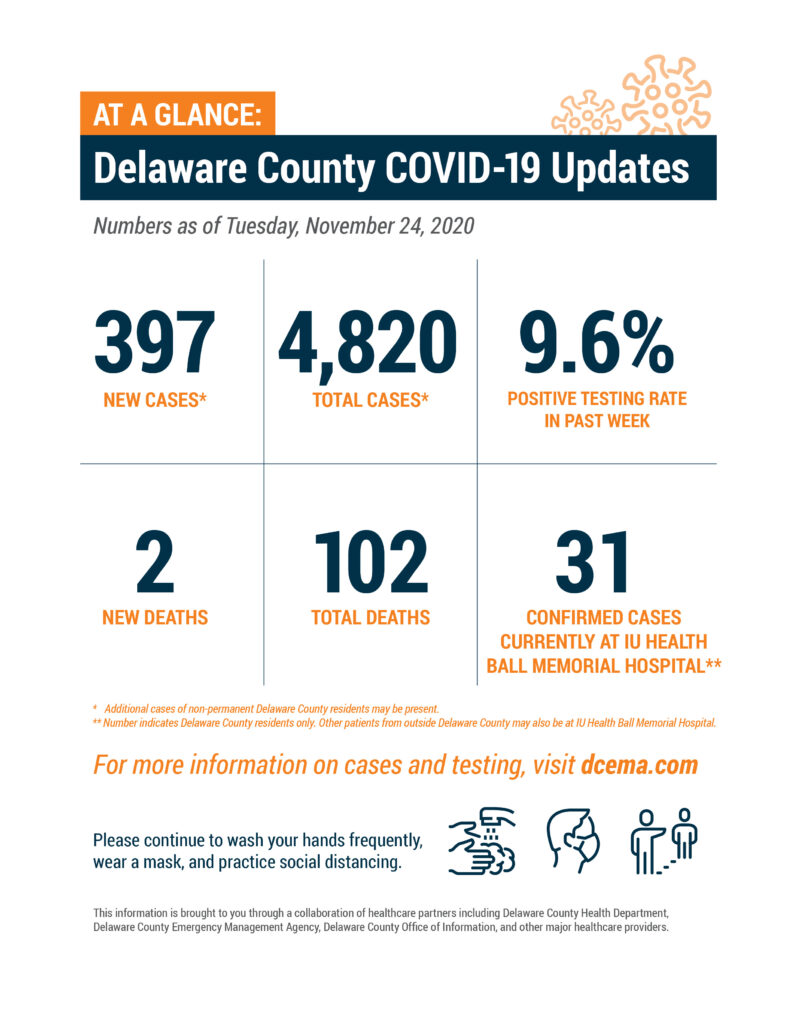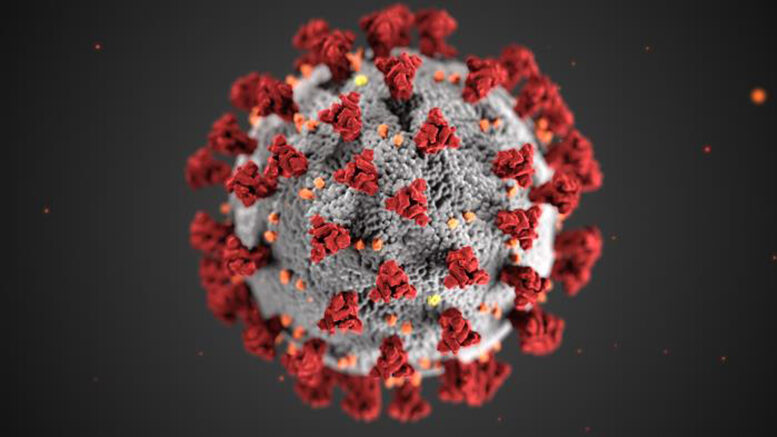Editor’s note: Due to the Thanksgiving holiday, this week’s COVID update was released early. The following COVID-19 update is brought to you through a collaboration of healthcare partners including Delaware County Health Department, Delaware County Emergency Management Agency, Delaware County Office of Information, and other major healthcare providers. This week’s report is being published early due to the holiday; the next report will be released on Thursday, Dec. 3.
Heading into Thanksgiving, Delaware County remains orange on the Indiana State Department of Health’s county metrics map. Orange is the second-to-worst score a county can receive, indicating moderate to high level of community spread of COVID-19.

With numbers continuing to rise—as of Tuesday, Nov. 24, the county has reported 397 new cases and 2 new deaths since the last report on Thursday, Non. 19—health officials urge residents to remain cautious through Thanksgiving, including wearing a mask and social distancing around others (even family members), dining outside if possible, and avoiding travel and large gatherings.
“This will be a very personal and difficult decision for many of us,” Hank Milius, president and CEO of Meridian Health Services, wrote in a media release. “This may be the year for virtual family celebrations or in-person, outdoor Friendsgivings.”
Based on Delaware County’s orange ranking, which is calculated based on new cases and the 7-day positivity rate—gatherings of 50 people or more are prohibited. Delaware County’s 7-day positivity rate is, as of print, at 9.6%; the CDC suggests this number should be well under 5%.
As of Nov. 24, IU Health Ball Memorial Hospital is treating 67 confirmed cases of COVID-19, 31 of which are Delaware County residents. Statewide, IU Health’s ICU beds are 74% full.
“The cases in Delaware County continue to rise exponentially,” said Dr. Donna Wilkins, health officer of the Delaware County Health Department. “It is more important than ever to stay home if you are ill, wear a mask, social distance and use good hand hygiene. Everyone needs to work together to get this under control.”
Doctors are also reminding families of the importance of following guidelines around their children.
“While severe COVID-related illness is rare in children compared with the elderly, there are instances of complications such as multisystem inflammatory syndrome in otherwise healthy children,” said Dr.
Robert Byrn, a pediatrician in Muncie. “We are recommending families take the illness seriously and adhere to social distancing and masking requirements.”
At Ball State University—which has 114 active cases of COVID-19 as of Nov. 23—all course instruction will be moving online after Thanksgiving and until Jan. 19. The university has partnered with the Indiana State Department of Health to offer rapid antigen tests to students who wish to get tested before they leave this week. All students will be required to get tested before returning to campus in January.
For more information on Delaware County’s COVID-19 total cases and deaths, as well as testing location information, visit dcema.com. Testing location hours may differ this week due to the holiday.
Frequently Asked Questions
I got tested for COVID-19. Now what?
Individuals who get tested because they have symptoms should quarantine after their test until they receive their results. If the test is positive, they must continue to isolate. Isolation can end after ALL of the following have occurred:
- 10 days have passed since onset of symptoms
- If fever was a symptom, 24 hours have passed with no fever, without use of fever-reducing drugs
- Other symptoms are improving (however, loss of taste/smell may persist and does not to be factored into thisrequirement)
However, a person who has tested positive should follow their healthcare provider’s advice on when to end isolation.
If you are not symptomatic but get tested because of close contact with someone who has tested positive, you should quarantine for 14 days after the last contact with the positive person. The ideal timeframe for an asymptomatic person to get tested due of exposure is about 5 days after the exposure. Even if your test result comes back negative, you still need to quarantine the full 14 days. This is because it may take several days after exposure for COVID-19 to be detected by a test.
What is a “close contact”?
The CDC definition of “close contact” includes the following:
- You were within 6 feet of someone who has COVID-19 for a total of 15 minutes or more, with or without masks. (This is 15 total minutes over the course of 24 hours. E.g., three five-minute periods of time throughout one day would count as close )
- You provided care at home to someone who is sick with COVID-19.
- You had direct physical contact with the person (hugged or kissed them).
- You shared eating or drinking
- They sneezed, coughed, or somehow got respiratory droplets on
Should I/my child get tested for COVID-19 even if only mild cold-like symptoms, like a runny nose, are present?
Anyone experiencing symptoms of illness should isolate at home to avoid the risk of spreading illness to others. With the improved availability of testing, DCHD would further recommend testing to any such individual. Additional information concerning when you can return to work and what to do if your test is positive is available for review at cdc.gov.
If I test positive for COVID-19, how should close contacts be informed?
Anyone who tests positive should proactively seek to notify anyone they have had close contact with, as far back as 48 hours before their symptom onset. Positive individuals should also cooperate with any contact tracing calls they receive from the State, so that state contact tracers can also document and notify close contacts of their need to quarantine.
What should I do if I witness a business and/or citizen failing to comply with guidelines from the state or county?
Complaints can be lodged through the Delaware County Health Department Citizen Complaint Form, most easily available through the Delaware County Coronavirus Hub at dcema.com.
Will getting a flu shot protect me from COVID-19?
While some evidence exists that the flu vaccine may help with protection against COVID-19, this vaccine should not be considered a protection against COVID-19. Instead, protection against influenza infection may prove beneficial to the population by lowering the number of flu illnesses overall and freeing up space in the healthcare system for those infected with COVID-19 or needing other healthcare.
What are the symptoms of COVID-19?
People who have COVID-19 may exhibit any range of these symptoms, and some may even show no symptoms at all. Symptoms may appear 2–14 days after being exposed to the virus. Some symptoms of COVID-19 include:
- Fever or chills
- Cough
- Shortness of breath or difficulty breathing
- Fatigue
- Muscle or body aches
- Headache
- New loss of taste or smell
- Sore throat
- Congestion or runny nose
- Nausea or vomiting
- Diarrhea
Anyone with these symptoms should stay home as much as possible and limit their exposure to others. Children who have any of the above symptoms should be kept home from school. For more information, read the Indiana State Department of Health’s guidelines for returning to school here.
What should I do if I think I might have COVID-19?
If you have any of the above symptoms or have been in contact with someone who tested positive for COVID-19, you should immediately begin to self-quarantine to prevent spreading the disease to others. You should also call a local health clinic to arrange to be tested. Follow your doctor’s orders and continue to self-quarantine until you receive negative test results.
Children who exhibit any of the above symptoms should NOT be sent to school. If your child shows any of the listed symptoms, keep the child home in quarantine and contact your healthcare provider for further guidance.
Where can I get tested?
Several local health clinics offer COVID-19 tests, including Meridian Health Services, Open Door Health Services, and more.
Open Door offers free community tests for individuals with or without symptoms, made available through a partnership with the Delaware County Health Department. Those who wish to get tested are encouraged to register online in advance at opendoorhs.org/testing for a quicker testing visit. For anyone unable to pre-register, on-site registration is available.
For a complete list of testing locations in Delaware County, visit the Delaware County Indiana Coronavirus Hub. Be advised that some locations may test only those who exhibit symptoms of COVID- 19. Testing location hours may differ this week due to the holiday.
Staying Safe from COVID-19
To keep yourself safe from COVID-19 and to reduce the spread of the disease, wash your hands often for at least 20 seconds, wear a mask when inside public spaces and when in crowded areas, and practice social distancing.
If you have symptoms of COVID-19 or have been in contact with someone who tested positive, schedule an appointment to get tested as soon as possible. Self-quarantine until you have received negative test results. A list of testing locations can be found on the Delaware County Indiana Coronavirus hub.
Under state mandate, gatherings in Delaware County are currently limited to no more than 50 people. Events with more than 50 attendees will not be approved by the Delaware County Health Department.



